The lowdown on chatbots: Why Facebook's AI shutdown isn't apocalyptic

The nightmare scenario painted by the media has been blown out of proportion – chatbots are not taking over the world, at least not anytime soon. For a long time, the common theme of machines rising up against their creators has remained more of a sci-fi concept than a real world one. However, recent headlines describing Facebook's misadventures with their chatbots have been nothing short of apocalyptic.
- Facebook AI Creates Its Own Language In Creepy Preview Of Our Potential Future
- Facebook shuts down chatbot experiment after AIs spontaneously develop their own language
- Facebook manages to shut down chatbot just before it could become evil
Panic spread like wildfire. People were freaking out over bots talking in a language of their own. On the surface, what happened may seem worrying. However, a deeper look into the situation reveals a far less scary reality – the bots chatted in a language that contained garbled sentences, and it was neither surprising nor intelligent.
The experiment from Facebook comes out of a lab called Facebook Artificial Intelligence Research (FAIR). Back in June, FAIR announced that they have "open-sourced code and published research introducing dialog agents with a new capability — the ability to negotiate." For one to make sense out of the Facebook situation, one must first understand what chatbots are.
What are chatbots?
A chatbot is basically a service that is powered by artificial intelligence and governed by specific rules. The chatbots communicate with humans via a chat interface. These chatbots mimic conversations with people. The service can be a number of different things, from self-initiated tasks to quasi-conversation.
For example, if a company such as Adidas were to make a bot, a customer could simply message on, say, Facebook and directly ask it for what they require. Instead of them getting lost in the labyrinth of a website, they can have a conversation with the bot, similar to an experience with a salesman in the retail store. The service already lives in a number of major chat products.
What happened at Facebook
Here's a lowdown of what happened in Facebook’s Artificial Intelligence Research lab. Researchers showed how it is possible for these dialog agents with differing goals to "engage in start-to-finish negotiations with other bots or people while arriving at common decisions or outcomes." The researchers thought up a game to study negotiation on a multi-issue bargaining task.
The premise: A simple game for two players. The two players were told to divide items such as two books, one hat, three balls.
It was a three-step program. First, the researchers fed these bots many negotiation scenarios that were played out by humans. Second, the bots were “trained 'end to end' purely from the language and decisions that humans made". Third, the researchers allowed the bots to "achieve the goal of negotiation". They allowed the bots to practice thousands of negotiations amongst themselves in a technique known as reinforcement learning.
When these two bots played against each other, they stopped using proper English sentences in an attempt to do things faster. Having both agents' parameters updated simultaneously proved to be the issue. "Updating the parameters of both agents led to divergence from human language as the agents developed their own language for negotiating," said the researchers.
Here's what it was like:
"Bob: I can i i everything else
Alice: balls have zero to me to me to me to me to me to me to me to me to
Bob: you i everything else
Alice: balls have a ball to me to me to me to me to me to me to me to me"
Facebook's ultimate goal was to have these bots play with humans and altered the code to make the bots stick to a recognisable language. It stopped working on one prototype and built another smarter bot that did the work it set out to do in English.
"While the idea of AI agents inventing their own language may sound alarming/unexpected to people outside the field, it is a well-established sub-field of AI, with publications dating back decades," Facebook researcher Dhruv Batra wrote in a blog post. "Simply put, agents in environments attempting to solve a task will often find unintuitive ways to maximize reward. Analyzing the reward function and changing the parameters of an experiment is NOT the same as “unplugging” or “shutting down AI”. If that were the case, every AI researcher has been “shutting down AI” every time they kill a job on a machine."
The research continues
AI researchers working on the complex aspects of negotiation are spawning all over the world. Researchers' long-term AI goal is for personal bot-agents to be the norm on the internet. These bot-agents can perform simple tasks like making travel bookings, finding a carpenter, or ordering food in a much more efficient manner than humans. These researchers, working on negotiating AI bots have their own Olympics. The Eighth International Automated Negotiating Agents Competition will take place in Melbourne, Australia.
The goal of these Olympics is to "to encourage design of practical negotiation agents that can proficiently negotiate against unknown opponents in a variety of circumstances". One of the leagues is "Negotiation Strategies for the Diplomacy Strategy Game".
First published: 8 August 2017, 18:46 IST

